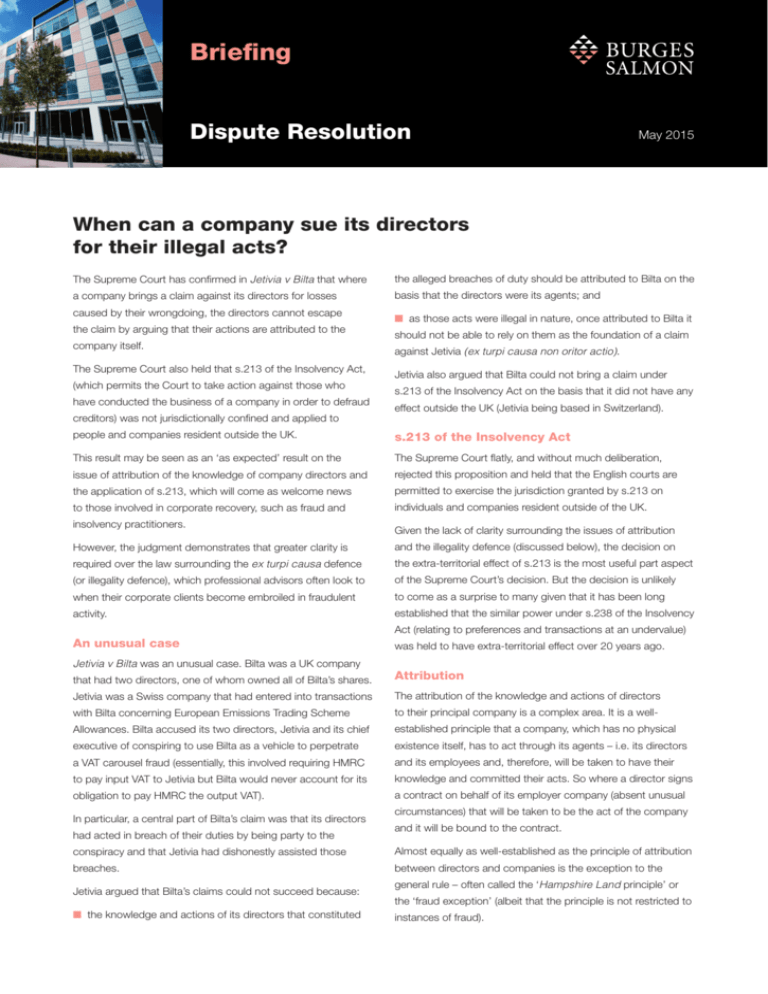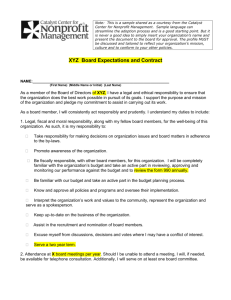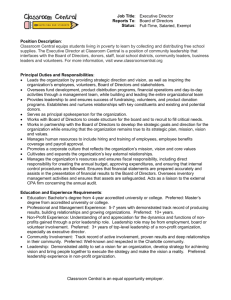
Briefing
Dispute Resolution
May 2015
When can a company sue its directors
for their illegal acts?
The Supreme Court has confirmed in Jetivia v Bilta that where
the alleged breaches of duty should be attributed to Bilta on the
a company brings a claim against its directors for losses
basis that the directors were its agents; and
caused by their wrongdoing, the directors cannot escape
the claim by arguing that their actions are attributed to the
company itself.
The Supreme Court also held that s.213 of the Insolvency Act,
(which permits the Court to take action against those who
have conducted the business of a company in order to defraud
creditors) was not jurisdictionally confined and applied to
n as those acts were illegal in nature, once attributed to Bilta it
should not be able to rely on them as the foundation of a claim
against Jetivia (ex turpi causa non oritor actio).
Jetivia also argued that Bilta could not bring a claim under
s.213 of the Insolvency Act on the basis that it did not have any
effect outside the UK (Jetivia being based in Switzerland).
people and companies resident outside the UK.
s.213 of the Insolvency Act
This result may be seen as an ‘as expected’ result on the
The Supreme Court flatly, and without much deliberation,
issue of attribution of the knowledge of company directors and
rejected this proposition and held that the English courts are
the application of s.213, which will come as welcome news
permitted to exercise the jurisdiction granted by s.213 on
to those involved in corporate recovery, such as fraud and
individuals and companies resident outside of the UK.
insolvency practitioners.
Given the lack of clarity surrounding the issues of attribution
However, the judgment demonstrates that greater clarity is
and the illegality defence (discussed below), the decision on
required over the law surrounding the ex turpi causa defence
the extra-territorial effect of s.213 is the most useful part aspect
(or illegality defence), which professional advisors often look to
of the Supreme Court’s decision. But the decision is unlikely
when their corporate clients become embroiled in fraudulent
to come as a surprise to many given that it has been long
activity.
established that the similar power under s.238 of the Insolvency
Act (relating to preferences and transactions at an undervalue)
An unusual case
Jetivia v Bilta was an unusual case. Bilta was a UK company
was held to have extra-territorial effect over 20 years ago.
that had two directors, one of whom owned all of Bilta’s shares.
Attribution
Jetivia was a Swiss company that had entered into transactions
The attribution of the knowledge and actions of directors
with Bilta concerning European Emissions Trading Scheme
to their principal company is a complex area. It is a well-
Allowances. Bilta accused its two directors, Jetivia and its chief
established principle that a company, which has no physical
executive of conspiring to use Bilta as a vehicle to perpetrate
existence itself, has to act through its agents – i.e. its directors
a VAT carousel fraud (essentially, this involved requiring HMRC
and its employees and, therefore, will be taken to have their
to pay input VAT to Jetivia but Bilta would never account for its
knowledge and committed their acts. So where a director signs
obligation to pay HMRC the output VAT).
a contract on behalf of its employer company (absent unusual
In particular, a central part of Bilta’s claim was that its directors
had acted in breach of their duties by being party to the
circumstances) that will be taken to be the act of the company
and it will be bound to the contract.
conspiracy and that Jetivia had dishonestly assisted those
Almost equally as well-established as the principle of attribution
breaches.
between directors and companies is the exception to the
Jetivia argued that Bilta’s claims could not succeed because:
n the knowledge and actions of its directors that constituted
general rule – often called the ‘Hampshire Land principle’ or
the ‘fraud exception’ (albeit that the principle is not restricted to
instances of fraud).
In the present case the directors’ knowledge and acts were
anti-competitive activity3. But there is still no clear statement of
clear breaches of the duties they owed Bilta that arose out
how and when the defence will arise.
of the agency relationship directors share with their principal
company. What was more, those duties had been wilfully
Public Policy
breached by the directors in order to injure Bilta itself, the very
Although no decision was made on the extent of the illegality
person to whom those duties were owed.
defence, the Supreme Court did appear to agree that as a
In those circumstances it would be paradoxical to allow the
directors to rely on the nature of their relationship with Bilta
in order to escape liability for abusing that relationship. As a
result, this was not a case where the directors’ knowledge
could be attributed to the company.
While this is a welcome, and undoubtedly correct, result, the
Supreme Court appears to have avoided laying down any
general principles for how and when there will be an exception
to the attribution rule
Ex turpi causa – the illegality defence
The ex turpi causa principle, in essence, provides that a
claimant cannot succeed on a claim that requires him to rely on
his own illegal acts (the “illegality defence”). This has long been
an opaque area of law, which became murkier still following the
House of Lords decision in Stone & Rolls v Moore Stephens.
matter of public policy the defence should never be available to
directors accused of breaching the statutory duties they owe
to shareholders and (in an insolvency situation) creditors. The
very purpose of those duties is to give shareholders or creditors
(through the company of its liquidator) some form of recourse
against directors who have committed wrongdoing that has
caused the company loss.
However, as the Supreme Court decided the case on the basis
of no attribution, it did not reach a binding decision on this
issue.
Conclusion
With numerous cases raising the illegality defence in
increasingly inventive ways it is hoped that this issue will reach
the Supreme Court sooner rather than later and some clarity
can be brought to the issue.
In that case a firm of accountants raised the defence to a
No doubt any future cases that raise the issue will be keen
claim for failing to prevent the claimant, ‘one shareholder, one
closely followed.
director’ company from perpetrating a massive fraud on a
bank.
The Supreme Court discussed Stone & Rolls and the law on
the illegality defence in great detail but were unable to reach
1
Hounga v Allen,
3
Safeways v Twigger and Tesco v MasterCard
2
Les Laboratoires Servier v Apotex
a conclusion as to where the law now stands. The most that
was achieved appears to be: (i) a warning that the decision in
Stone & Rolls should effectively be shelved and not treated
as authority in future cases; and (ii) that the law of the illegality
defence needs to be clarified by the Supreme Court as soon as
possible.
Clarity in this area would be welcomed by insolvency
Contacts
David Hall
Partner
+44 (0) 117 902 2798
david.hall@burges-salmon.com
practitioners, auditors, accountants, solicitors and many others
as, following Stone & Rolls, it has become an increasingly
popular defence, occasionally in quite unexpected contexts.
In recent times it has been raised, with varying degrees of
success, as a defence based on: (i) contracts effecting human
Matt Walker
Associate
+44 (0) 117 307 6002
matthew.walker@burges-salmon.com
trafficking1; (ii) breaches of intellectual property rights2; and (iii)
Burges Salmon LLP, One Glass Wharf, Bristol BS2 0ZX Tel: +44 (0) 117 939 2000 Fax: +44 (0) 117 902 4400
6 New Street Square, London EC4A 3BF Tel: +44 (0) 20 7685 1200 Fax: +44 (0) 20 7980 4966
www.burges-salmon.com
Burges Salmon LLP is a limited liability partnership registered in England and Wales (LLP number OC307212), and is authorised and regulated by the Solicitors Regulation Authority. It is also regulated by the Law Society of
Scotland. Its registered office is at One Glass Wharf, Bristol BS2 0ZX. A list of the members may be inspected at its registered office. Further information about Burges Salmon entities, including details of their regulators, is set
out in the ‘Who we are’ section of the Burges Salmon website at www.burges-salmon.com.
© Burges Salmon LLP 2015. All rights reserved. Extracts may be reproduced with our prior consent, provided that the source is acknowledged. Disclaimer: This briefing gives general information only and is not intended to be
an exhaustive statement of the law. Although we have taken care over the information, you should not rely on it as legal advice. We do not accept any liability to anyone who does rely on its content.
Data Protection: Your details are processed and kept securely in accordance with the Data Protection Act 1998. We may use your personal information to send information to you about our products and services, newsletters
and legal updates; to invite you to our training seminars and other events; and for analysis including generation of marketing reports. To help us keep our database up to date, please let us know if your contact details change
or if you do not want to receive any further marketing material by contacting marketing@burges-salmon.com.
BRM0913 05 15









